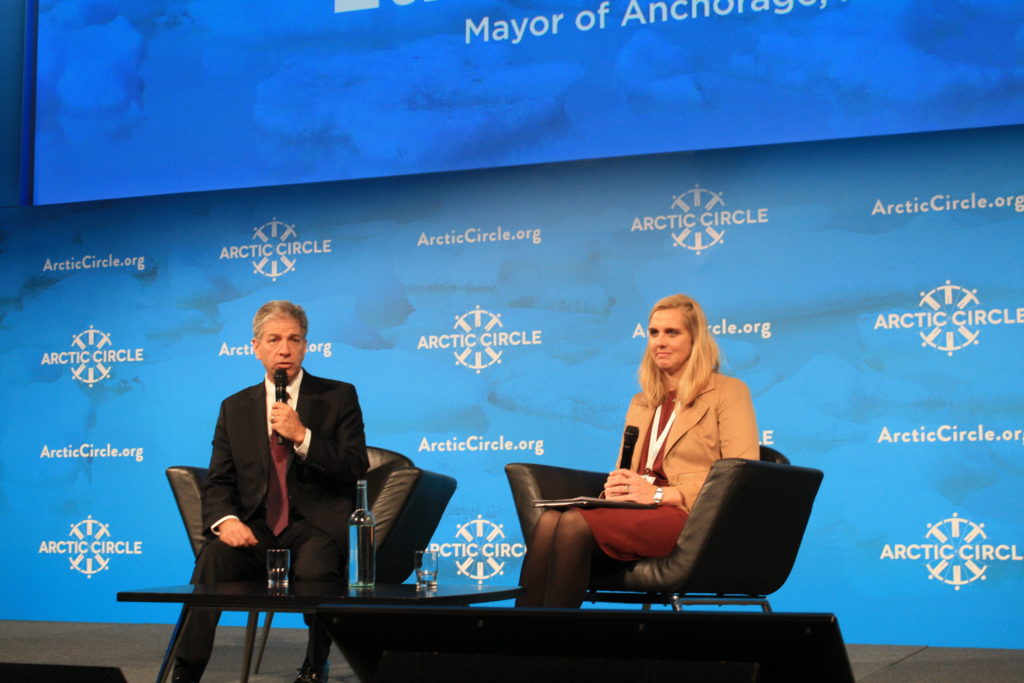Grappling with shared issues, northern mayors have created an international Arctic cities’ forum
Local leaders in the Arctic will take on common challenges and explore potential solutions to environmental, economic and political issues.

Local leaders from 13 cities around the Arctic formally inaugurated the Arctic Mayors Forum at an event in Akureyri, Iceland, on Thursday to discuss issues affecting Northern communities.
Mayors and Indigenous leaders from all eight Arctic nations were already meeting at various conferences throughout the North, but found they lacked a forum to dedicated to the common issues that affect cities across the Arctic.
“This organization aims to give local government a voice in the development of the Arctic,” Ásthildur Sturludóttir, the mayor of Akureyri, said this week at the Arctic Circle Assembly in Reykjavik.
“There’s a great diversity in the people of the North, and yet there are some very common themes that we all live with,” said Ethan Berkowitz, the mayor of Anchorage, Alaska, at the same event. These issues include infrastructure, communications, food and water, transportation, education, energy and other natural resources.
“We have to go out past where we can see,” Berkowitz said. “We cannot continue to do things in the same way as we’ve done in the past and expect results to be different.”
Local governments are the closest to actual constituents, he pointed out: “People expect their garbage to be picked up, they expect the lights to go on, they expect the water to flow.” For that reason, he said, local governments tend to be more stable even as national and international governance systems encounter turbulence — and they can play a valuable role in bringing local Arctic issues to the forefront.
“We are the government that is closest to the people,” Madeleine Redfern, the mayor of Iqaluit, Canada, told ArcticToday. “If those basic services are not met, then we have a problem and we have to address it.”
This forum can provide a more formal way of sharing tried-and-true responses to Northern challenges, Redfern said. She recalled a time when she brought up fiber-optic connectivity in Iqaluit, and she was told it wasn’t possible to employ that kind of technology in the Arctic. Yet it was already being used in Nuuk and Svalbard, and would soon be implemented in Alaska.
“It can be done elsewhere,” Redfern said. “It is being done elsewhere.” By sharing experiences like these, local leaders can take possible solutions that are already working elsewhere to their regional and national governments. “There’s no point in reinventing the wheel if some other Arctic community and Arctic nation has dealt with the issue,” she said.
And solutions that work in the South might not work as well in the North. Often, Redfern said, it makes more sense to look at her Arctic neighbors than to other communities in Canada, because the conditions are so different.
Yet when the challenges unique to living in the North prevent local communities from connecting to the national and global economies, it’s a further marginalization of Arctic residents, Berkowitz said in Iceland.
“For too long, the North has been viewed as a place to be exploited and studied,” he said. “We are a place with people and history. We would like to have a greater voice in our own self-determination.”
Like other international forums, particularly the Arctic Council — whose structure it parallels — the Arctic Mayors’ Forum will have a rotating presidency, a secretariat (though not one with permanent offices in the short term) and working groups.
The Arctic Mayors’ Forum plans to hold a biennial general assembly, and aims to eventually achieve observer status at the Arctic Council.
Representatives from 11 cities signed Thursday’s agreement: Akureyri, Oulu, Sermersooq, Rovaniemi, Torshavn, Anchorage, Iqaluit, Arkhangelsk, Bodø, Kemi and Tromsø. Others have joined since then, and other mayors and Indigenous leaders are welcome, Berkowitz said.